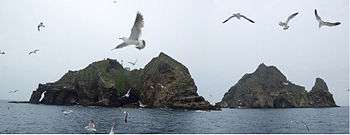Dokdo
Dokdo (독도, 獨島) is an island off the east coast of South Korea, next to the larger Ulleungdo island. It is made up of two islets, Seodo (서도, 西島, West Island) and Dongdo (동도, 東島, East Island).

The islands are also known as the Liancourt Rocks, a name given by a French whaling ship in 1849, and as Takeshima (竹島, たけしま) by the Japanese who claim sovereignty.
|
While Dokdo is the subject of a territorial dispute between South Korea and Japan, it is de facto controlled by the South Korean government. This page does not represent a political endorsement of either side of the dispute. |
Understand
History
A political hot spot, this speck of an island has a complicated and contentious history stretching back to 512 A.D. Korean and Japanese fisherman have fished in nearby waters since time immemorial, and references to a Korean island that may or may not be Dokdo have been documented in historical records since the 6th century.
For a while now there has been a heated debate between Korea and Japan, with both staking claim to the island. In 1905 Japan incorporated the island into its territory by claiming that it was terra nullius (land belonging to no one). Korea was a Japanese protectorate at the time and in no position to object.
After World War II, the San Francisco Peace Treaty of 1952 explicitly gave Korea control of Jeju, Ulleungdo and Geommun-do, but Dokdo was left out of the agreement completely and the islands have been under de facto Korean control ever since. To this day, Japan continues to claim their sovereignty which proves to be a very sore point in Japan-Korea relations.
Access to visitors was limited until Japan's Shimane prefecture declared a "Takeshima Day", inflaming the already volatile situation. The Korean government responded by opening the island up to tourists on March 24, 2005. Since then, an average of 80,000 visitors visit the island every year.
Inhabitants
A fisherman by trade, Kim Sung-Do and his wife Kim Shin-Yeol are the only permanent residents on the island. There are also a small dispatch of security police officers, representatives from the Ministry of Maritime Affairs and Fisheries and three lighthouse keepers who reside there on rotation.
Get in
Japanese citizens should check in advance before attempting to travel to Dokdo. All other nationalities should have no issue.
Questions (in Korean) can be directed to the Ulleungdo and Dokdo Administrative Office under the telephone number 054-790-6645~6.
By boat
To get to Dokdo, you must first get to Ulleungdo. There is only one charter company that has boats ferrying you to and fro. The Dae-A-Express has two ports, Pohang in North Gyeongsang-do and Mukho in Gangwon-do. From Pohang, it takes about three hours to get to Ulleungdo from the mainland. It takes a little less time from Mukho, about two and a half hours. The boats leave once a day. From Pohang the ticket fare is ₩58,000. From Mukho it's a little cheaper at ₩49,000.
The Dae-A-Express and the Tour and Shipping Company operate ferries to Dokdo. There are three boats that leave daily. However the ferry schedule is subject to frequent changes. So it is advisable to reserve seats to Dokdo before reserving them to Ulleungdo. Prices range from ₩42,000 to ₩45,000.
Get around
The island is tiny, and you can access everything by foot.
See
|
Dokdo is an important part of modern Korean national identity, but doesn't actually have much, if anything, to offer foreign tourists. If you like the idea of a long and bumpy sea trip followed by views of an interesting rocky outcrop then it may be for you, but be aware it is a rather niche destination generally. |
The small island is mainly volcanic rock with patches of lush grass. The two islets that make up Dokdo, each have their own particular features. Seodo (West islet), the smaller of the two, is where the fisherman and his wife live. Their house is at the bottom of the steep cliffs. Dongdo (East islet) has a large crater at the top that runs right to the water. The other highlight is the "Hyeongje" Cave. It is also where the security officers are stationed. Between the two is another cave, the "Cheonjang-gul".
Because the warm and cool currents converge in the surrounding area, a great variety of fish thrive there. Also Dokdo is home to a multitude of birds. One of the reasons the island was closed off to the public was to preserve the natural ecology.
Do
Typically you would have just 20 minutes to look around, so just some limited walking is possible.
Stay safe
Since the island is so far from the mainland, the weather can get extremely erratic and at times the boats will not run because sea storms or choppy water. It is prudent to call ahead of time.
Many Koreans are concerned about the possibility of a military attack by Japan in order to reclaim the islands. Whilst Japan does indeed contend the ownership of the islands very strongly, any suggestion of military action is extremely farfetched.
Connect
The three main South Korean Telecom Providers (KT, SK and LG) offer fast LTE internet connectivity over their mobile phone networks, with dedicated base stations on the rocks.
Go next
On the same boat back to the island of Ulleungdo.